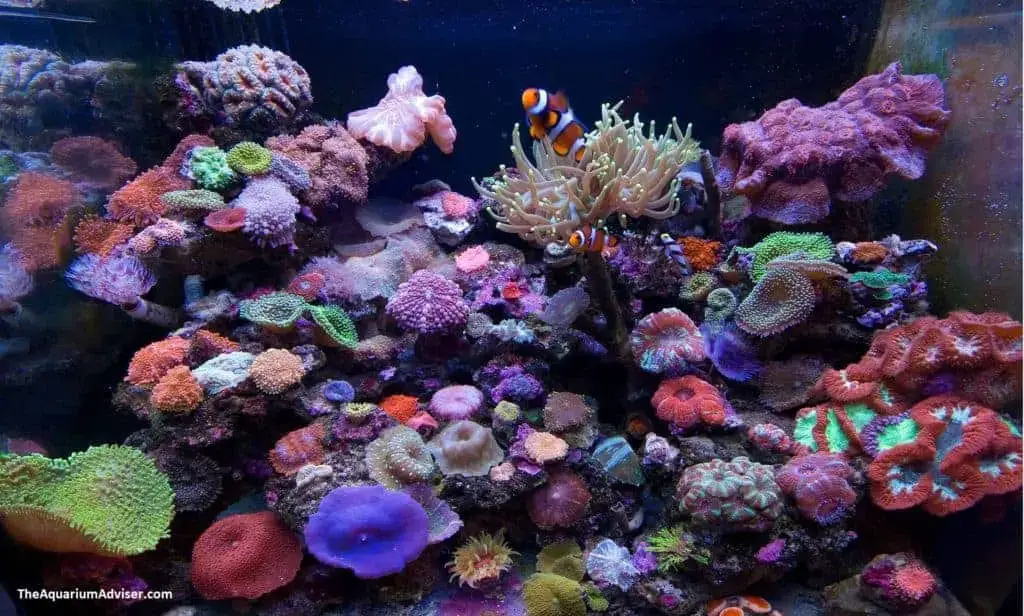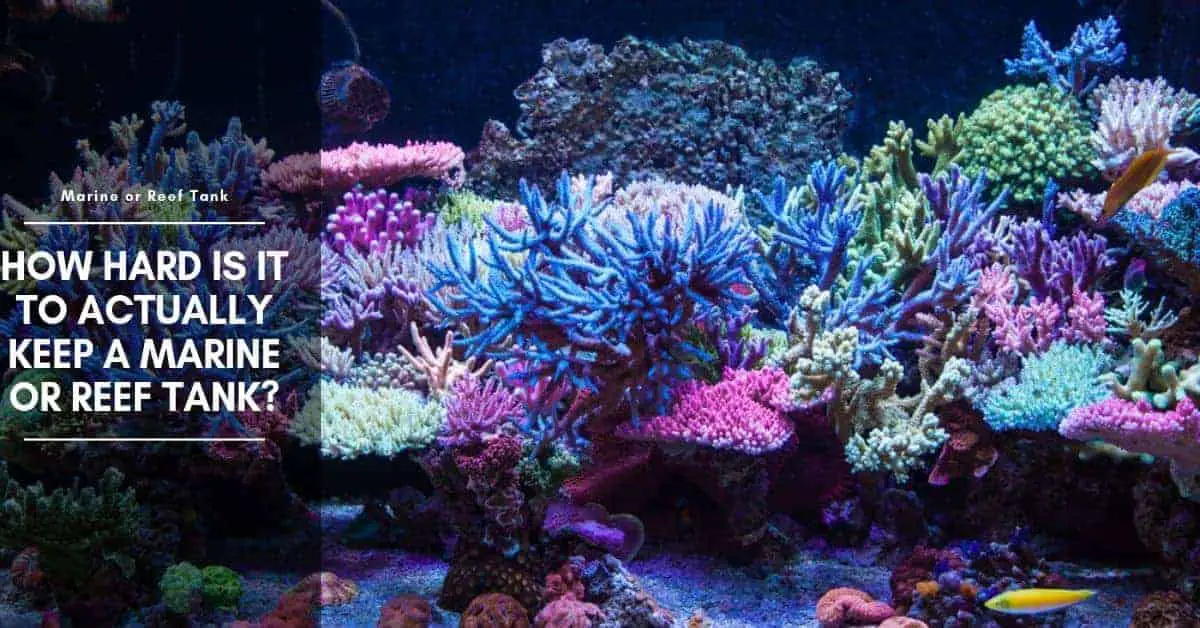Today I want to tackle saltwater aquarium myth, how hard is it to actually keep a marine or reef tank. I see posts from people that say – “I could never keep a marine tank” or – “saltwater fish are really hard to keep alive”. Those statements were a hundred percent true when the hobby first started. The original pioneers had to learn the hard way by trial and error. Imagine getting your first Copperband Butterflyfish but having no idea that they’re finicky feeders. While having every coral you put in your tank turn brown but no idea why.

This was absolutely the day-to-day life for the people that entered the hobby many years ago. Their many failures in comparison to each success generated a reputation for the hobby that to this day all these years later has still stuck. As with most things, life moves on, and in this hobby, that progression has been rapid new research and inventions come out all the time and with each advancement, the hobby gets easier and easier.
The hobby as it is today is virtually unrecognizable to when it first started, however, its reputation seems to have stayed the same, but why? I’m going to let you all in on a little secret, this hobby isn’t difficult now, that statement is a little vague, but let’s alter it slightly before you run out and buy your first fish tank. This hobby is as easy or as difficult as you make it.
4 Conditions to keep a saltwater tank.
There are 4 conditions to that statement which absolutely affect how easy is to keep a saltwater tank.
- Equipment selection.
- Stocking choice.
- Research.
- Commitment.
If you get these balances correctly, I believe virtually anyone can do this. All 4 of these are key components by themselves, but they also directly affect each other as well.
if for example, you decided that Anthias fish on your stocking list for your Nano reef tank, firstly you are already picking a fish which is harder to keep and putting in a tank which is too small. Secondly, they require some research to discover they need additional feeding. And finally, you’re accepting a greater commitment because you need to feed the tank more often, and as a result, you need more maintenance to remove a greater amount of waste.
Equipment selection
So let’s look at the first topic of equipment selection. This is a very large topic and what I’ll cover in a later post but I’ll cover it briefly now. There is no perfect set up for running a marine or reef tank. Different people have different levels of success using different methods and I don’t believe there is one particular method which is superior to all the rest, What I do know is a larger tank is more stable, therefore you want to get the largest tank you can afford and are willing to maintain. Stability is key to this hobby and a nano tank certainly isn’t the easy route. It’s not just the tank either which can make a big difference. There is so much equipment these days, which can significantly impact how easy a system is to run.
API STRESS ZYME Freshwater and Saltwater Aquarium Cleaning Solution 16-Ounce Bottle
API ACCU-CLEAR Freshwater Aquarium Water Clarifier 4-Ounce Bottle
30% OffAPI GENERAL CURE Freshwater and Saltwater Fish Powder Medication 10-Count Box
17% OffProtein skimmers will help to export waste, auto top-ups will deal with evaporation, dosing pumps will keep your parameters stable, monitors can tell you if something’s wrong, and for the lazy people, you can even get an auto feeder. The list goes on and on.
Stocking
The next topic is livestock. There are lots of things that affect how easy life can be and making the right selections at the beginning, can make a massive difference. When it comes to fish you want something which many people are known to have success with, which have an appropriate adult size for your tank, they aren’t particularly aggressive, are disease resistant, and aren’t finicky feeders.
Clownfish and some tangs like powder blue are a good example of this. And yes, these fish can be aggressive. That can be true however, they are probably in 95% of reef tanks, and they aren’t causing anywhere near the same amount of issues as something like a clown triggerfish. All fish have the ability to be aggressive to an extent even an old Mandarin could be extremely vicious towards his tank mates. Other creatures like dwarf seahorse have a reputation for being very peaceful.
You also want fish that are compatible with each other, and if you want a reef tank, coral as well. Coral selection is the same as fish. Some corals have a very low care requirement, and will literally grow in almost any tank. While others are virtually impossible to keep in captivity.
If you pick corals that have a proven record of success in all different types of tanks, such as many soft corals, you’re on the right path to an easy tank. Naturally, if you pick corals that are more difficult like SPS corals, you’re already giving yourself a much harder time. This is why research before you purchase, is so important. If you know as much about what you’re buying before you buy it, you can make an educated decision as to if it’s right for your system.
Research
So let’s move on to research. We are born into this world knowing very little, and almost everything we do, we had to learn at some point. fish keeping is no different, if you don’t do your research, it can be incredibly hard, but then again if you aren’t taught how to swim use a computer or be nice to fellow human beings some people find these things to be pretty hard as well.
Not doing your research these days is inexcusable, the pioneers back at the beginning had an excuse there was no research. But these days with mobile phones most of us have the knowledge of some of these geniuses at the touch of our fingertips. Research has nothing to do with intelligence either. Humans appear to have the ability to absorb the information they are interested in, and this escalates as we try to fuel our fascination with a particular subject.
Knowledge can be a slippery slope though, never be arrogant enough to think you know everything and always be willing to accept other people’s ideas. The research applies more than ever when something’s dying. If something is dying, you should always endeavor to find out why shrugging your shoulders, and just saying corals are delicate is not a valid reason. Corals don’t just randomly die, especially if they’ve been in your tank for an extended period of time.
They die because something in their environment is no longer acceptable for their survival. Putting the effort into researching a particular issue, can have long-term benefits as you’ll know how to deal with it and prevent it from happening again. If you aren’t willing to commit to the required research from the beginning not only will your time in this hobby be much harder, it’ll also be much more painful. This leads us nicely onto commitment, which in my opinion is the most important part.
Commitment
Our tanks rely completely on us, and more often than not the biggest issue any of our tanks face is our own laziness. The most successful people in the hobby of those that have a strict routine, and rarely deviate from it. These are the people that meticulously do their research clean their glass, change and test their water weekly, and are constantly trying to correct that tiny issue that no one else ever spots.
Because let’s face it, no one ever thinks their own tank is perfect. People that don’t test their water playing Russian roulette, it might be fine today, it might be fine tomorrow, but at some point in time, it won’t be fine and by then it’s often too late. So if you don’t have a basic selection of test kits, make sure you buy a set before your next purchase, because without them, the reality is you have no idea if your tank is in perfect condition, or one day away from becoming a toxic fish soup.
To briefly sum up 2 people can enter the Hobby exactly the same time, but they can have very different experiences based on the 4 points I’ve just discussed, and how easy they decide to make it for themselves.

Hi, my name is Sean, and I’m the primary writer on the site. I’m blogging mostly about freshwater and saltwater aquariums, fish, invertebrates, and plants. I’m experienced in the fishkeeping hobby for many years. Over the years I have kept many tanks, and have recently begun getting more serious in wanting to become a professional aquarist. All my knowledge comes from experience and reading forums and a lot of informative sites. In pursuit of becoming a professional, I also want to inspire as many people as I can to pick up this hobby and keep the public interest growing.
Read more about Sean.
Please join also my Facebook group.















